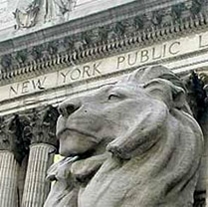Grant Spotlight | April 1, 2014
Share This
 |
|
Grantee: New York Public Library Grant: Laura Bush 21st Century Librarians Program – Continuing Education, 2011
|
|
Contact: Marzena Ermler, Manager of Professional Development
Website:
|
“Library staff members traditionally feel hesitant to answer financial questions for fear of litigation and other risks. Money Matters changed the culture across the library system and showed staff that providing people with authoritative resources is not advice, but it is the best kind of help they can give.”
– Kristin McDonough, New York Public Library Director
In the New York Public Library (NYPL) system, reference staff members are equipped to guide patrons through a diverse array of resources on topics ranging from literature and science to music, technology, and much more. Yet, when it came to financial topics, many library employees didn’t feel comfortable answering questions about such personal topics. From three boroughs of the city, clients with financial inquiries—even basic questions—were referred to the central Science, Industry and Business Library (SIBL) in midtown Manhattan. Against a backdrop of a recession, the ability to provide customers with readily available resources to help them navigate credit repair, debt reduction, and make decisions about retirement savings became more critical than ever.
With a grant from IMLS, NYPL sought to change the culture of reluctance to provide financial assistance to patrons. The library system designed the grant project to create a corps of frontline public service staff across its 90 neighborhood branches that could make informed referrals to relevant online personal finance resources. The Money Matters staff training program aimed to educate librarians and information assistants on core concepts and personal finance reference sources, increase their comfort levels in providing reference services in these areas, and provide staff with the opportunity to host presentations by experts and conduct the trainings that their neighborhood communities needed most.
Making Finance Accessible and Fun
NYPL used the IMLS funding to hire Rutgers University faculty to develop and then deliver core curriculum courses and follow-up elective workshops. The training module topics were informed by staff surveys of common reference questions and the areas they felt would most help their patrons. In addition to onsite training, NYPL made the project’s training materials freely available and reproduced several curriculum topics as e-learning modules in NYPL’s staff development portal for those who weren’t able to participate in person.
Participation in Money Matters courses was voluntary across branches. To promote the initiative, NYPL pitched the trainings at network meetings in each borough, made town hall presentations, and created a dialogue to build staff and branch manager buy-in. The trainings addressed intense and serious subjects—paying for college, getting out of a credit crunch, recognizing financial dangers, and more. To lift spirits in the classroom and increase engagement, instructors showed vignettes and videos played by avatars. They also used games like Jeopardy-style tournaments, quizzes, and interactive activities such as role-playing to reinforce learning.
Empowering Staff to Empower Patrons
Instructors found that one of the most helpful takeaways for participants was learning to confidently and firmly resist the pressure of patrons who insisted on direct advice. Instead, they learned to guide clients to vetted, timely, and relevant online resources, some with financial calculators so that patrons could work out financial matters themselves. Much of the library staff’s previous discomfort and resistance was due to the sensitive nature of the financial inquiries. Trainers instructed librarians on approaches to inquiries, keeping privacy concerns in mind, as well as ways to demonstrate to customers how to protect their information on public computers and online.
The end goal of the project was to enhance reference service to the public. This required the staff to first experience the personal gain of improving their own financial literacy, which they found especially rewarding. For the first time ever, many staff members accessed their credit ratings for free. Given the personal nature of the topic, if staff members didn’t feel good about their own ability to deal with finances, it was hard for them to be enthusiastic and feel confident helping others. Once they felt familiar with the resources, they felt comfortable and empowered to help others do the same.
Boosting the Learning Potential
More than 250 public service librarians, support staff such as clerical, technical and information assistants, and even library managers participated, and all of them took part in at least three sessions. Evaluation findings for all workshops in the program showed uniformly excellent responses to the quality of instruction, content, activities, and resources. Participants consistently reported that all workshops were practical, relevant, enjoyable, and were useful to them in their daily interactions with NYPL patrons. Across branches, Money Matters is among the top five programs requested by staff members. Library branches have also begun to offer more financial classes for the public, with experts from the Social Security Administration, the Museum of American Finance, and the Financial Planning Association.
In a six-month period, there were 2,282 page views to the Money Matters web resources by reference staff. With the aid of workshops and web resources to support library staff, higher-quality service is available to NYPL patrons seeking personal finance information. Ultimately, staff members were more likely to welcome personal finance questions after having gone through training and were more connected with the needs of their patron base. The library and Dr. Barbara O’Neill, NYPL’s Rutgers partner, have presented the program and its results to wide audiences, sharing this replicable model at WebWise, the American Library Association, and the New York Library Association conferences, as well as with the American Association of Family and Consumer Sciences, the National Urban Extension Conference, the American Savings Education Council, and others. It is the hope of project leaders that Money Matters will help to inspire culture shifts at information and reference desks across the country, and in turn, open the public up to a new wealth of resources.
